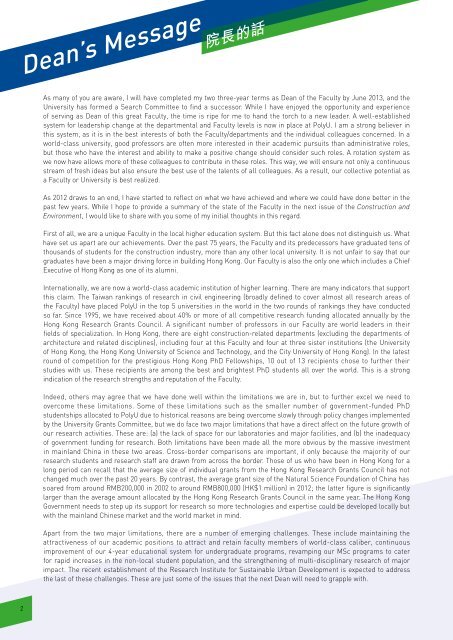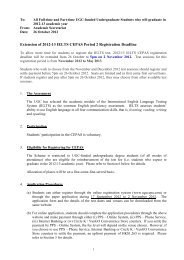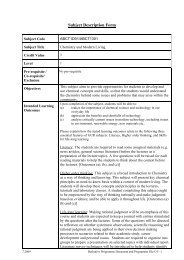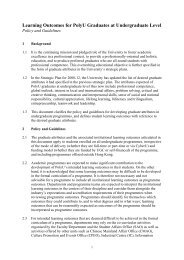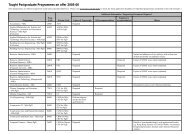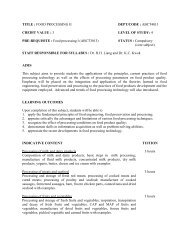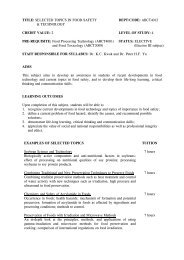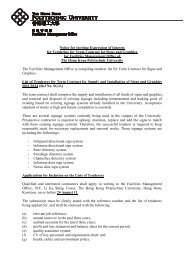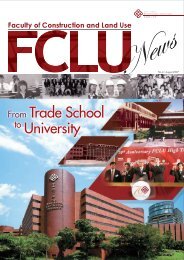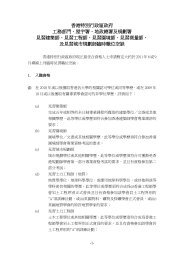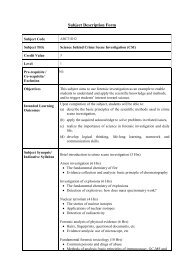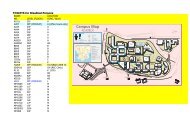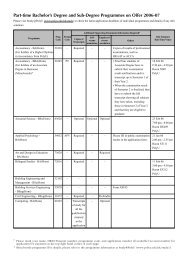CONSTRUCTION ENVIRONMENT - The Hong Kong Polytechnic ...
CONSTRUCTION ENVIRONMENT - The Hong Kong Polytechnic ...
CONSTRUCTION ENVIRONMENT - The Hong Kong Polytechnic ...
You also want an ePaper? Increase the reach of your titles
YUMPU automatically turns print PDFs into web optimized ePapers that Google loves.
Dean’s Message<br />
<br />
As many of you are aware, I will have completed my two three-year terms as Dean of the Faculty by June 2013, and the<br />
University has formed a Search Committee to find a successor. While I have enjoyed the opportunity and experience<br />
of serving as Dean of this great Faculty, the time is ripe for me to hand the torch to a new leader. A well-established<br />
system for leadership change at the departmental and Faculty levels is now in place at PolyU. I am a strong believer in<br />
this system, as it is in the best interests of both the Faculty/departments and the individual colleagues concerned. In a<br />
world-class university, good professors are often more interested in their academic pursuits than administrative roles,<br />
but those who have the interest and ability to make a positive change should consider such roles. A rotation system as<br />
we now have allows more of these colleagues to contribute in these roles. This way, we will ensure not only a continuous<br />
stream of fresh ideas but also ensure the best use of the talents of all colleagues. As a result, our collective potential as<br />
a Faculty or University is best realized.<br />
As 2012 draws to an end, I have started to reflect on what we have achieved and where we could have done better in the<br />
past few years. While I hope to provide a summary of the state of the Faculty in the next issue of the Construction and<br />
Environment, I would like to share with you some of my initial thoughts in this regard.<br />
First of all, we are a unique Faculty in the local higher education system. But this fact alone does not distinguish us. What<br />
have set us apart are our achievements. Over the past 75 years, the Faculty and its predecessors have graduated tens of<br />
thousands of students for the construction industry, more than any other local university. It is not unfair to say that our<br />
graduates have been a major driving force in building <strong>Hong</strong> <strong>Kong</strong>. Our Faculty is also the only one which includes a Chief<br />
Executive of <strong>Hong</strong> <strong>Kong</strong> as one of its alumni.<br />
Internationally, we are now a world-class academic institution of higher learning. <strong>The</strong>re are many indicators that support<br />
this claim. <strong>The</strong> Taiwan rankings of research in civil engineering (broadly defined to cover almost all research areas of<br />
the Faculty) have placed PolyU in the top 5 universities in the world in the two rounds of rankings they have conducted<br />
so far. Since 1995, we have received about 40% or more of all competitive research funding allocated annually by the<br />
<strong>Hong</strong> <strong>Kong</strong> Research Grants Council. A significant number of professors in our Faculty are world leaders in their<br />
fields of specialization. In <strong>Hong</strong> <strong>Kong</strong>, there are eight construction-related departments (excluding the departments of<br />
architecture and related disciplines), including four at this Faculty and four at three sister institutions (the University<br />
of <strong>Hong</strong> <strong>Kong</strong>, the <strong>Hong</strong> <strong>Kong</strong> University of Science and Technology, and the City University of <strong>Hong</strong> <strong>Kong</strong>). In the latest<br />
round of competition for the prestigious <strong>Hong</strong> <strong>Kong</strong> PhD Fellowships, 10 out of 13 recipients chose to further their<br />
studies with us. <strong>The</strong>se recipients are among the best and brightest PhD students all over the world. This is a strong<br />
indication of the research strengths and reputation of the Faculty.<br />
Indeed, others may agree that we have done well within the limitations we are in, but to further excel we need to<br />
overcome these limitations. Some of these limitations such as the smaller number of government-funded PhD<br />
studentships allocated to PolyU due to historical reasons are being overcome slowly through policy changes implemented<br />
by the University Grants Committee, but we do face two major limitations that have a direct affect on the future growth of<br />
our research activities. <strong>The</strong>se are: (a) the lack of space for our laboratories and major facilities, and (b) the inadequacy<br />
of government funding for research. Both limitations have been made all the more obvious by the massive investment<br />
in mainland China in these two areas. Cross-border comparisons are important, if only because the majority of our<br />
research students and research staff are drawn from across the border. Those of us who have been in <strong>Hong</strong> <strong>Kong</strong> for a<br />
long period can recall that the average size of individual grants from the <strong>Hong</strong> <strong>Kong</strong> Research Grants Council has not<br />
changed much over the past 20 years. By contrast, the average grant size of the Natural Science Foundation of China has<br />
soared from around RMB200,000 in 2002 to around RMB800,000 (HK$1 million) in 2012; the latter figure is significantly<br />
larger than the average amount allocated by the <strong>Hong</strong> <strong>Kong</strong> Research Grants Council in the same year. <strong>The</strong> <strong>Hong</strong> <strong>Kong</strong><br />
Government needs to step up its support for research so more technologies and expertise could be developed locally but<br />
with the mainland Chinese market and the world market in mind.<br />
Apart from the two major limitations, there are a number of emerging challenges. <strong>The</strong>se include maintaining the<br />
attractiveness of our academic positions to attract and retain faculty members of world-class caliber, continuous<br />
improvement of our 4-year educational system for undergraduate programs, revamping our MSc programs to cater<br />
for rapid increases in the non-local student population, and the strengthening of multi-disciplinary research of major<br />
impact. <strong>The</strong> recent establishment of the Research Institute for Sustainable Urban Development is expected to address<br />
the last of these challenges. <strong>The</strong>se are just some of the issues that the next Dean will need to grapple with.<br />
2


